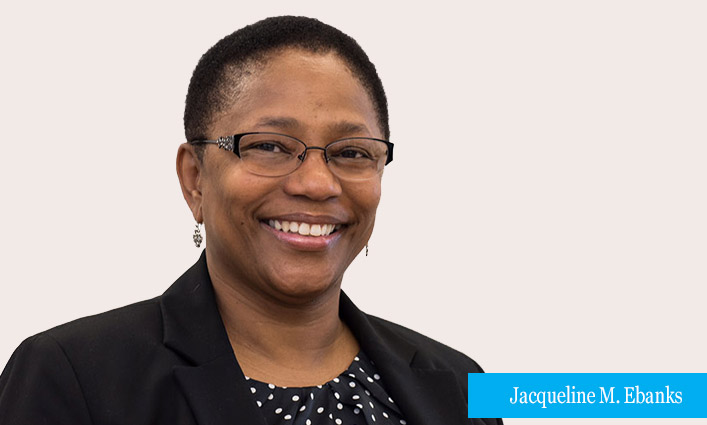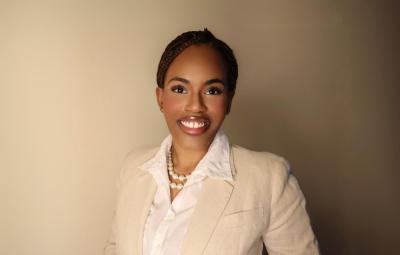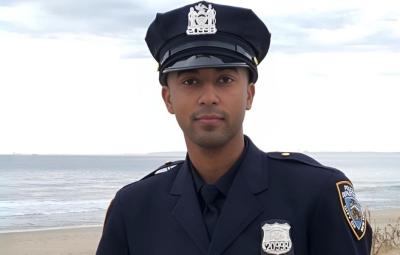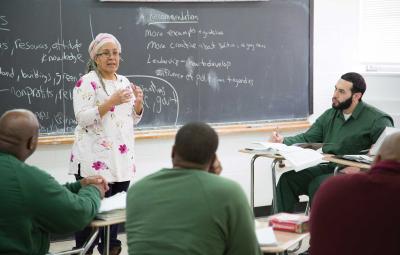
Interested in learning more about New York City’s efforts to promote economic growth and social justice for women, girls, and marginalized communities? Join us on September 22 when John Jay’s Women in the Public Sector sits down with Jacqueline M. Ebanks, Executive Director of the New York City Commission on Gender Equity, as part of its Women in Public Sector webinar series. Cosponsored by the Office of External Affairs, the series shines a light on women working in the public sector space and the role they play in informing policy and being change agents in society. For over three decades, Ebanks has worked to uplift underserved and underrepresented communities with her extensive experience in public policy, philanthropy, and non-profit work. In anticipation of the event, we sat down with Ebanks to learn more about her work at the Commission on Gender Equity and how the commission has served New York City residents.
“If we don’t educate the public, if we are not informed by the public, if we don’t do research, if we don’t create partnerships within city agencies and within the private sector, we are not going to be successful.”—Jacqueline M. Ebanks
Tell us a bit about your life before the Commission on Gender Equity.
I received my master's degree from Stony Brook University. While I was there, I had a fellowship with the Center for Women in Government, which led me to a six-month internship in the New York State Legislature where I worked with the task force on women's issues. Those six months were invaluable because I was able to see up close how the government works. I eventually found my home working in public policy and advocacy at an organization now called FPWA (Federation of Protestant Welfare Agencies), which is an umbrella organization of over 200 non-profits working in desperate social service fields.
It was while I was at FPWA that I was introduced to the concept of capacity building, management, and organizational infrastructure. I recognized how all of these had to work together to have efficient, sustainable programs and outcomes for families. If we don’t educate the public, if we are not informed by the public, if we don’t do research, if we don’t create partnerships within city agencies and within the private sector, we are not going to be successful. I think we have to ask policy analysts, as people who are in public management, to recognize that we are responsible for driving sustainable, systemic change.
“The Commission on Gender Equity operates with an intersectional lens that looks at how gender intersects with physical disabilities, mental disabilities, age, socioeconomic status, sexual orientation, immigrant status, faith, and race.”—Jacqueline M. Ebanks
What is the Commission on Gender Equity?
The Commission on Gender Equity is a permanent advisory board within the New York City government that focuses on issues of gender inequity that impact girls, women, transgender, and gender non-binary New Yorkers. We have three operating principles: We work within economic mobility and opportunity, health and reproductive justice, and safety. The Commission on Gender Equity operates with an intersectional lens that looks at how gender intersects with physical disabilities, mental disabilities, age, socioeconomic status, sexual orientation, immigrant status, faith, and race. When a city is developing policies, we need to look at how these policies affect people living at those intersections. We are composed of 32 individuals from all walks of life and all sectors in New York City serve on this commission. We work, not only to end gender discrimination but to also eliminate the barriers to gender equity and to build equitable policies and practice. This ensures that all people, regardless of gender identity, gender expression, or background, have the opportunity to thrive in New York City.
“We wanted to figure out how people were faring according to our three areas of focus. One was economic mobility and opportunity. Was there job security? Was there food security?”—Jacqueline M. Ebanks
What are some recent accomplishments of the Commission on Gender Equity?
When the pandemic occurred, the Commission on Gender Equity released a survey called the “Gender Equity and Covid-19 Recovery Survey.” We wanted to figure out how people were faring according to our three areas of focus. One was economic mobility and opportunity. Was there job security? Was there food security? We also wanted to look at how the division of labor was impacted in the home, as well as issues of safety, health, and reproductive justice. Regarding safety, we asked people whether they felt more vulnerable at home now, pre-pandemic, post-pandemic, at work, or in public spaces? Their responses indicated that vulnerability in public places shot up regardless of gender. Work was also fairly high. In addition, seven percent of female respondents felt vulnerable at home. We also asked about mental health. Are you more anxious now than you were before the pandemic? That data is now coming back, and just as we would expect, there was a huge jump in anxiety. The data reflected that females were reporting to be more anxious than males or transgender and gender non-binary individuals.
What is also important is that we had men who responded. In total we had 1,366 individuals respond to the survey with the breakdown of respondents along the lines of 64 percent female, 30 percent male, and the rest were transgender and gender non-binary. I am pleased that the survey acknowledged the diversity of gender and takes a different approach to gender equity. One really powerful example is that someone on twitter asked, “How do I answer this if I'm trans-male?” Within three minutes of releasing the survey, we saw that we needed to make changes and we went back and did that. We also asked respondents if they wanted to remain in touch with us. Over 300 individuals left an email. We are going to follow up every four months with them so that we can have a longitudinal study on this issue.
“Be positive contributors to the work that you are doing. It is in learning from your current position that your next moment opens up.”—Jacqueline M. Ebanks
What advice do you have for John Jay students who want to work in public policy?
Learn how to find your friends in partnerships and collaborations. It is equally essential to know how to be there for others. Understand that you are on a journey and while we all have benchmarks, life never unfolds according to your plans. Absorb that lesson. Be positive contributors to the work that you are doing. It is in learning from your current position that your next moment opens up. Learn that you can bloom where you are. I learned to give my best to every opportunity to learn as much as I can. I then made connections that impacted the partnerships that I created. In the beginning, I would serve on the board of a nonprofit while I was working in a different position. Through all of that, I was able to understand the ecosystem in New York City. My advice is to be a continual learner.



